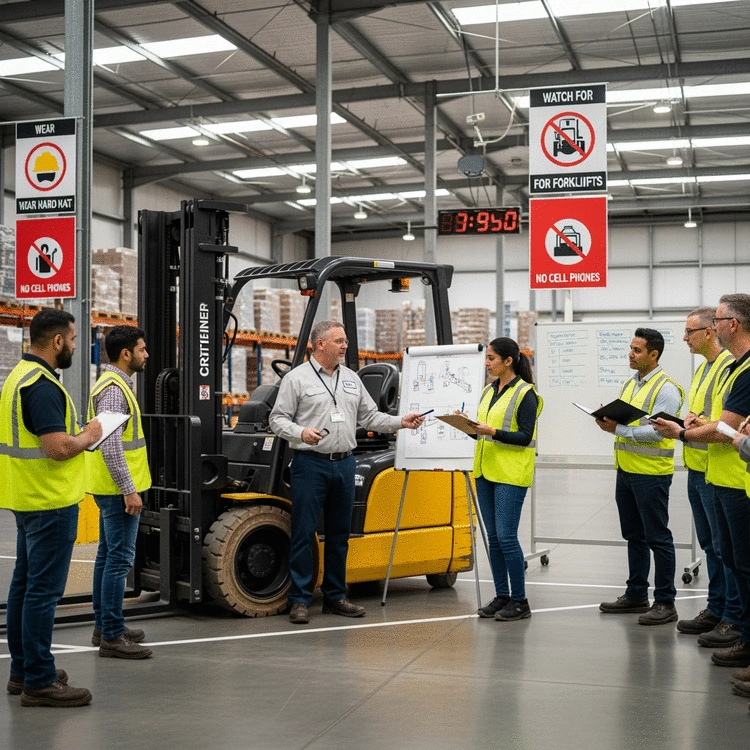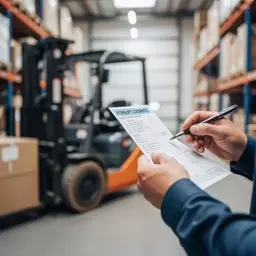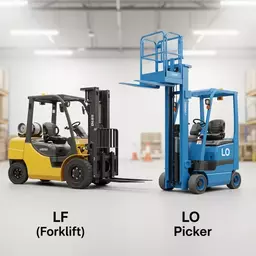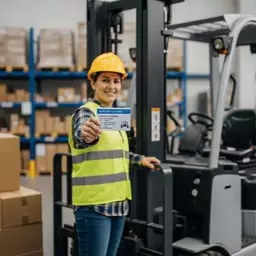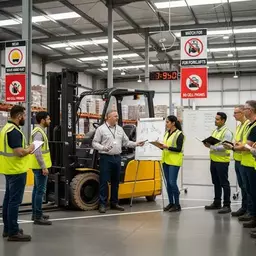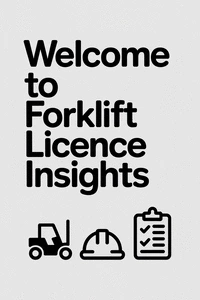Are you ready to take control of your career and become a certified forklift operator? The journey begins with understanding the crucial role of accredited training. Let’s dive into the key lessons you’ll learn!
What You Will Learn
- Choosing an accredited provider ensures compliance with safety regulations and enhances your learning experience.
- Accredited training programs are recognized by employers, giving you a competitive edge in the job market.
- Understanding OSHA and ANSI regulations is vital for safe forklift operation and preparation for certification tests.
- Gathering required documentation early streamlines the registration process for your forklift training.
- Participating in skills assessment programs boosts your confidence and prepares you effectively for certification tests.
Your Journey to a Forklift Licence: Key Stages and Benefits
This visual outlines the essential steps in obtaining a forklift licence and highlights the advantages of accredited training.
Choose Accredited Provider
Ensures quality instruction, compliance with regulations, and industry recognition.
Register for Courses
Research RTOs, check schedules, complete forms, and pay fees to secure your spot.
Documentation & Prerequisites
Prepare ID, prior certificates, medical forms, and ensure minimum age/experience.
Skills Assessment Programs
Identify areas for practice, get personalized feedback, and boost confidence for tests.
Key Benefits
- • Improved Job Opportunities
- • Enhanced Safety Awareness
- • Potential for Higher Earnings
Understanding the Importance of Accredited Forklift Licence Training
Are you embarking on the journey to obtain your forklift licence? It's crucial to understand the importance of accredited training. Choosing an accredited provider not only ensures that you receive high-quality instruction but also keeps you aligned with safety regulations. Without this foundation, you may risk your career and workplace safety! For a deeper dive into what to expect from your training, check out this comprehensive forklift licence training guide for Australia.
Accredited training programs are designed to meet industry standards and legal requirements, ensuring you learn the necessary skills to operate a forklift safely and efficiently. Trusting reputable providers, like those recommended by Forklift Licence Insights, can significantly enhance your learning experience.
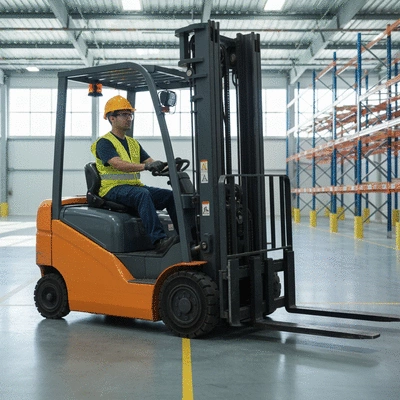
Why Choose an Accredited Provider for Forklift Training?
When selecting a forklift training provider, it's essential to prioritize accreditation. Here are a few reasons why:
- Compliance with Regulations: Accredited providers adhere to local and national compliance guidelines, ensuring you receive training that meets legal requirements.
- Quality Education: These providers typically offer experienced instructors and well-structured programs, which enhance your learning.
- Recognition: Employers often prefer candidates who have completed training from accredited programs, giving you a competitive edge in the job market.
In my experience, the right training can make all the difference when it comes to your confidence and skills as a forklift operator. I’ve seen many students thrive after receiving top-notch training from accredited providers!
Key Benefits of Obtaining a Forklift Licence
Getting your forklift licence doesn't just validate your skills; it comes with numerous benefits that can impact your career. Here are some key advantages:
- Improved Job Opportunities: Many industries require forklift operators to hold valid licences, increasing your employability.
- Enhanced Safety Awareness: Training helps you understand safety protocols, reducing the risk of accidents in the workplace.
- Potential for Higher Earnings: Licensed operators can often command higher wages due to their specialized skills.
Obtaining your licence is a smart investment in yourself! It not only opens doors but also reinforces your commitment to safety and professionalism in the industry.
The Role of OSHA and ANSI in Forklift Training Standards
Understanding the frameworks that govern forklift training is vital. The Occupational Safety and Health Administration (OSHA) and the American National Standards Institute (ANSI) set essential guidelines that affect your training. Here’s how:
- OSHA Regulations: OSHA mandates that operators must be trained and certified to ensure safe operation of forklifts, helping to prevent workplace accidents.
- ANSI Standards: ANSI provides specifications for equipment and training programs, ensuring consistency across the industry.
- Compliance Assurance: Understanding how these entities influence your training helps you choose accredited providers that meet these standards.
Being knowledgeable about these regulations not only prepares you for certification tests but also instills a sense of responsibility as you enter the workforce. Embrace this knowledge; it’s a fundamental part of being a safe forklift operator! For more details on compliance, consider reading about navigating forklift licence compliance laws.
Pro Tip
To maximize your forklift training experience, actively engage with your instructors and fellow students. Asking questions and participating in discussions can deepen your understanding and retention of the material. Remember, the more you interact, the better prepared you'll be for your certification test!
Next Steps: Enrolling in Forklift Training and Certification
So, you’re ready to take the plunge into the world of forklift training! Enrolling with an accredited provider is your first step toward obtaining your forklift licence. I can’t stress enough how crucial it is to choose a registered training organisation (RTO) that meets safety and compliance standards. This choice not only impacts your learning experience but also your future career opportunities!
To get started, you’ll want to visit the websites of nearby accredited providers. Look for their course offerings, schedules, and any specific requirements they may have. Once you’ve found a suitable provider, the registration process usually involves filling out an online form or contacting them directly. Don’t hesitate to ask questions—you deserve clarity on the training process!

How to Register for Courses with Accredited Providers
Registering for forklift training courses is straightforward, but here are the key steps to follow:
- Research local RTOs and find one that offers the course you need.
- Check the course schedule and ensure it fits your availability.
- Complete the registration form on the provider's website or call their office directly.
- Pay any associated fees to secure your spot in the class.
- Receive confirmation and any pre-course materials from the provider.
By following these steps, you’ll be well on your way to attending your first class! Remember, enrolling in a course is just the beginning of your journey to becoming a certified forklift operator.
Understanding Required Documentation and Prerequisites
Before you enroll, it’s important to gather the necessary documentation. Most accredited forklift training providers will require some basic information, such as:
- Your identification, such as a driver's licence or passport.
- Any prior forklift training certificates, if applicable.
- A completed medical declaration form, if required.
- Payment confirmation for course registration.
Be prepared to submit these documents when you register! Additionally, check if there are any prerequisites for the course, such as a minimum age or prior experience operating forklifts.
Utilizing Skills Assessment Programs to Prepare for Certification Tests
To boost your confidence before the certification test, consider participating in a skills assessment program. Many accredited providers offer this service, which can help you identify areas where you may need additional practice. Here’s how to make the most of these programs:
- Schedule an assessment with your training provider early on.
- Engage with instructors to get personalized feedback on your skills.
- Practice any areas where you feel less confident.
- Consider study groups with fellow students to share knowledge and strategies.
Engaging with a skills assessment program not only prepares you for your certification test but also enhances your learning experience. After all, the more prepared you are, the more successful you’ll be on test day! For tips on passing your test, check out these essential safety practices for forklift operators.
Frequently Asked Questions (FAQs)
Final Thoughts on Your Forklift Training Journey
As we wrap up, remember that finding the right accredited forklift training provider is just one piece of your journey. Every step you take toward certification—whether it’s registering for a course or gathering your documents—is a step toward enhancing your career.
Recap of Key Points on Finding Accredited Forklift Training Providers
To summarize, here are some essential takeaways for your forklift training journey:
- Always choose an accredited provider to ensure quality training.
- Gather required documentation early to streamline the registration process.
- Participate in skills assessments to prepare effectively for certification tests.
Staying organized and proactive will make your path to certification much smoother!
Encouragement to Take Action: Your Path to Certification Begins Here
Are you ready to embark on this journey? Don’t hesitate! Take action today—research your options, register for a course, and commit to your training. Remember, I’m here to guide you every step of the way at Forklift Licence Insights. Your future as a skilled forklift operator starts now, so let’s make it happen!
Recap of Key Points on Finding Accredited Forklift Training Providers
Here is a quick recap of the important points discussed in the article:
- Always choose an accredited provider to ensure quality training and compliance with safety regulations.
- Gather required documentation early to streamline the registration process and avoid delays.
- Participate in skills assessments to prepare effectively for certification tests and boost your confidence.
- Research local training organizations to find courses that fit your schedule and requirements.
- Engage with instructors and peers for a more enriching learning experience and networking opportunities.
